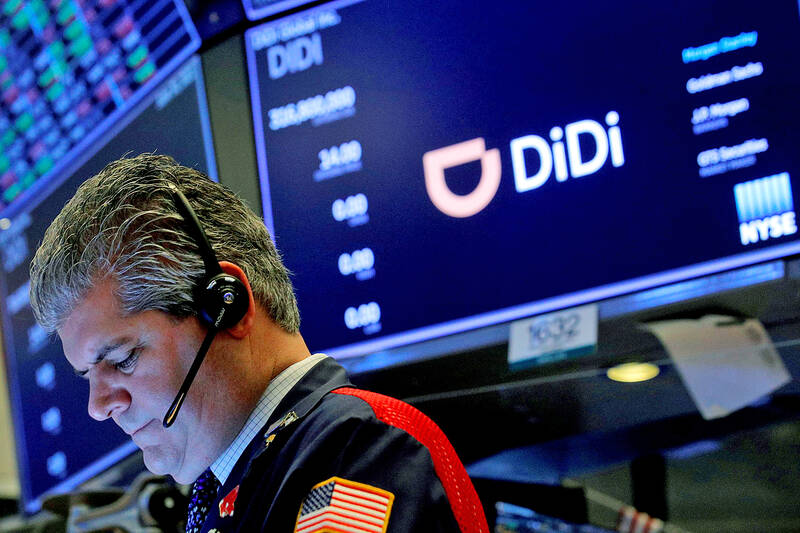Chinese authorities are set to allow Didi Global Inc’s (滴滴) ride-hailing and other apps back on domestic app stores as soon as next week, five sources said, in yet another signal that their two-year regulatory crackdown on the technology sector is ending.
Didi has been awaiting authorities’ approval to resume new user registrations and downloads of its 25 banned apps in China as a key step to resume normal business since its regulatory troubles started in the middle of 2021.
The lifting of the new user ban and app resumption for its flagship ride-hailing services and other businesses could take place before the Lunar New Year holiday, which starts next week, four of the sources said.

Photo: REUTERS
The one-week holiday would help Didi start to attract new users for the business and work toward bringing it back to normal, two of the sources added.
A lifting of the ban on Didi apps would come as Chinese policymakers seek to restore private-sector confidence and count on the technology industry to help spur economic activity that has been ravaged by the COVID-19 pandemic.
The People’s Bank of China is to step up support for private firms as part of steps to shore up the economy, while easing a crackdown on tech companies, Chinese Banking and Insurance Regulatory Commission Chairman Guo Shuqing (郭樹清) said on Sunday.
A restoration of apps would also signal Didi’s completion of a regulatory-driven revamp, and would come after the Chinese Cyberspace Administration in July last year imposed a US$1.2 billion fine on the company.
Two sources said that Didi paid the fine, the largest regulatory penalty imposed on a Chinese tech firm since Alibaba Group Holding Ltd (阿里巴巴) and Meituan (美團) were in 2021 fined US$2.75 billion and US$527 million respectively by the Chinese State Administration for Market Regulation.
The penalty on Didi was part of Beijing’s sweeping and unprecedented crackdown on the country’s technology titans over the past two years, which has sliced hundreds of billions of dollars off their values and shrunk revenues and profits.
Chinese regulators, led by the Cyberspace Administration, have in the past few weeks restarted to push forward with Didi’s app resumption approval process, two of the sources and another source with knowledge of the matter said.
The regulators, which last week submitted a report on the matter to top Chinese Communist Party leaders, look to formally get their nod in the next few days, two of them added.
Didi, launched in Beijing in 2012 and backed by prominent investors including Alibaba, Tencent (騰訊) and Softbank Group Corp, ran afoul of regulators when it in 2021 pressed ahead with a planned US stock listing against the regulators’ will, sources said previously.
That move triggered regulatory woes for Didi, with its 25 mobile apps ordered to be taken down from app stores, registration of new users suspended and it getting slapped with the fine over data-security breaches.
Didi was also forced to end its 11-month journey as a New York Stock Exchange-traded company in June last year, turning it from a poster child of China’s Internet boom to one of the biggest casualties of Beijing’s regulatory crackdown.

Vincent Wei led fellow Singaporean farmers around an empty Malaysian plot, laying out plans for a greenhouse and rows of leafy vegetables. What he pitched was not just space for crops, but a lifeline for growers struggling to make ends meet in a city-state with high prices and little vacant land. The future agriculture hub is part of a joint special economic zone launched last year by the two neighbors, expected to cost US$123 million and produce 10,000 tonnes of fresh produce annually. It is attracting Singaporean farmers with promises of cheaper land, labor and energy just over the border.

US actor Matthew McConaughey has filed recordings of his image and voice with US patent authorities to protect them from unauthorized usage by artificial intelligence (AI) platforms, a representative said earlier this week. Several video clips and audio recordings were registered by the commercial arm of the Just Keep Livin’ Foundation, a non-profit created by the Oscar-winning actor and his wife, Camila, according to the US Patent and Trademark Office database. Many artists are increasingly concerned about the uncontrolled use of their image via generative AI since the rollout of ChatGPT and other AI-powered tools. Several US states have adopted

A proposed billionaires’ tax in California has ignited a political uproar in Silicon Valley, with tech titans threatening to leave the state while California Governor Gavin Newsom of the Democratic Party maneuvers to defeat a levy that he fears would lead to an exodus of wealth. A technology mecca, California has more billionaires than any other US state — a few hundred, by some estimates. About half its personal income tax revenue, a financial backbone in the nearly US$350 billion budget, comes from the top 1 percent of earners. A large healthcare union is attempting to place a proposal before

KEEPING UP: The acquisition of a cleanroom in Taiwan would enable Micron to increase production in a market where demand continues to outpace supply, a Micron official said Micron Technology Inc has signed a letter of intent to buy a fabrication site in Taiwan from Powerchip Semiconductor Manufacturing Corp (力積電) for US$1.8 billion to expand its production of memory chips. Micron would take control of the P5 site in Miaoli County’s Tongluo Township (銅鑼) and plans to ramp up DRAM production in phases after the transaction closes in the second quarter, the company said in a statement on Saturday. The acquisition includes an existing 12 inch fab cleanroom of 27,871m2 and would further position Micron to address growing global demand for memory solutions, the company said. Micron expects the transaction to